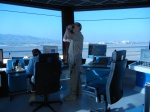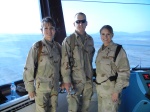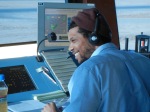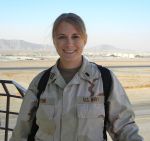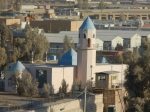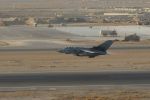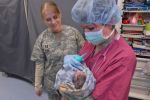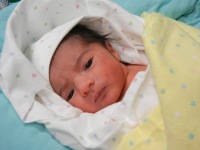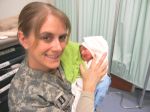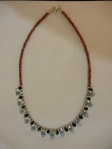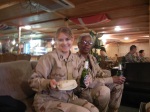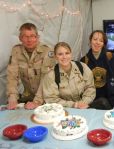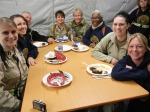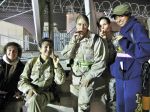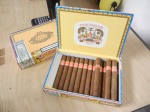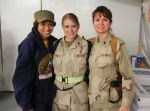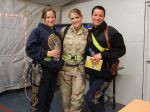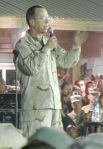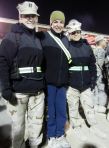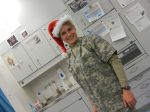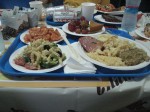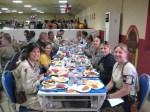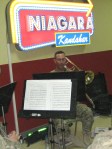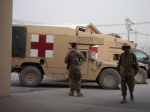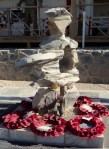Well, over the past couple weeks all we have had to complain about is all the mud we have been tracking into our rooms and the hospital due to the several days of rain around here. Now when it rains in Kandahar, it’s not like Seattle where it rains sometimes for days with no break in precipitation. Here it just drizzles for a short time and then stays gray for the rest of the day, then may drizzle again later on. However, because the ground is so hard packed here, the water is not absorbed and, instead lies on top of surface, causing large puddles and even flooding in some areas. The mud that forms from the rain mixing with the “sand” (more like fine, powdery dirt) becomes pasty and loves to cling to tread on the bottom of our boots. The hallways of our NATO housing are scattered with clumps of dirt as well as the hallways of the hospital. Housekeeping sweeps and buffs the floors every night, but as soon as the day shift crew walks through the doors, the shiny linoleum quickly becomes tarnished with dirt.
I will warn you that this blog entry may be disturbing to some. I wasn’t sure if I should write about my experience at work last night, but I think my friends and family should know what a night in the ICU here can be like. It is not all about Bazaars and birthday parties here. We are fighting a war over here. So here it is . . .
Last night, I was just about to head out the DFAC to grab something to eat for dinner when my phone rang. It was the ICU charge nurse requesting me and my room-mate to please come in as soon as possible because they were getting several patients from the OR. Several Army personnel were injured by an IED. When we arrived, there were so many people running around that it took several minutes for someone to even take notice of our presence. We asked people if they needed help, but everyone kept referring us to the charge nurse to receive our assignment. Eventually, I was assigned to a 25-year-old Army soldier named Patrick, due to come out of the OR at any time. All I knew was that he had multiple blast injuries, including major head trauma.
As soon as I saw the OR team rolling my patient through the door that separates the ICU from the OR suites, I grabbed the foot of the bed to help direct it to the right bay. The anesthesiologist, an older bald man with a slightly eccentric, grey mustache, asked me to get the ICU doctor. I found our intensivist and informed him that the patient had just arrived. Once at the bedside, the anesthesiologist told him everything that was done in the OR, but despite their efforts, he did not feel that the patient would survive very long. The patient was currently on the maximum dose of vasopressors (drugs used to improve contraction of the heart as well as blood pressure) and had already received over 30 units of blood products.
Once we got the monitor hooked up, his blood pressure was reading only 50/30. Essentially there was nothing else that could be done. He was bleeding out from multiple injuries, including his head, and not even surgery was able to stop it at this point. When I looked at his eyes, his pupils were fixed and dilated, a strong indication for brain death. When I lifted his head to reposition some tubing that had been caught under his neck, I could actually feel my hand mush into his skull. He was bleeding from his nose, his mouth and his ears. His left arm and both legs were wrapped tight with ace wrap bandages, but I could see large amounts of blood already oozing through.
When the anesthesiologist finished giving report to the ICU intensivist, they made a collaborative decision to withdraw support. I received orders to give morphine “to keep the patient comfortable.” Giving morphine to patients prior to withdrawing support is often a palliative measure that benefits the caregivers and family/friends of the patients more than it does the already-brain-dead patient. I administered the morphine and then, along with an Air Force medical technician who was helping us out, the two of us cleaned up Patrick’s face, chest and hands so that he looked more presentable. I knew there were several of his buddies anxiously waiting to come see him.
Because it had been so busy with so many casualties, the ICU doctor had not had a chance to inform Patrick’s Unit Liaison that we were withdrawing care. Luckily, his Chaplain walked in and I informed him of the fact that there was nothing else that we could do for him. He went out to the hallway where Patrick’s Unit members were waiting and notified them that this would be good bye. I was also told, by the Chaplain, that an Army General would be arriving in about 30 minutes to perform a Purple Heart Ceremony. I immediately informed the ICU doctor that I wanted to do whatever it took to maintain his blood pressure long enough so that he would still be alive for the ceremony. The doctor gave me permission to continue resuscitative measures using the vasopressive drips, as well as fluid boluses, to keep him alive just a little bit longer.
In the meantime, a female soldier who had been shielded by this hero during the blast, and thus only suffered a few minor injuries, was brought by wheelchair to his side to say goodbye. She immediately broke down in tears and starting screaming, “Fucking Taliban.” Through her sobs she spoke of her regrets that she wasn’t able to somehow stop this tragedy from happening. A wonderful female Medical Liaison for the Army personnel, stood next to her, explaining everything that we were doing to keep him comfortable. She consoled her, telling her that there was nothing she could have done. I had to grit my teeth as tears welled up in my eyes. “I must maintain my composure,” I reminded myself.
After she was wheeled back out of the ICU, I let the other member’s of Patrick’s Unit come in, four at a time, to say good bye. Some only stayed for less than a minute, then quickly retreated, while others lingered for longer periods of time, whispering words into Patrick’s ear. The Chaplain stood at the bedside, offering support and condolences. I continued to adjust the drips and hang more bags of fluid while I watched his blood pressure drift down to 35/20. I anxiously eyed the clock every few minutes, hoping for the General to arrive sooner rather than later because I wasn’t sure how much longer Patrick would live.
Finally the General walked in and stood next to me while an entourage of people, including a photographer snapping photos, filed into the bay. While the General waited for everyone to squeeze into the small space, he turned to me and shook my hand, saying, “Thank you for your service and providing such excellent care to our soldiers.” I replied with, “You are welcome, Sir and thank you for your service as well.” He then stepped up next to the patient and someone called the group to attention. The General presented Patrick with the Purple Heart Medal by placing it over his heart. The photographer snapped a few pictures. The award was then removed and placed into a protective case. And as quickly as they arrived, the General and his entourage were gone.
A few of Patrick’s buddies lingered, just standing with heads hanging low and hands behind their backs, probably feeling a lot like I did just before my mom died, hoping that suddenly the vital signs will reverse and go back up, proving us all wrong. But eventually, the drugs and the fluid boluses couldn’t keep up and I lost his peripheral pulses. I told the Chaplin that it was time to turn everything off and remove the breathing tube. I informed Patrick’s friends that they were welcome to stay, but if they wanted to step out, now was the time. My respiratory therapist then removed the tape holding his breathing tube in place and pulled it out as I turned off all the IV pumps. Within five minutes a flatline appeared on the monitor and I said, to the people who were gathered at Patrick’s side during his last minutes of life, “He’s gone,” and turned off the monitor. Shortly after that, the ICU doctor came and officially pronounced the time of death.
After allowing Patrick’s “family away from home” to sit with him for a while, another Corpsman and I bathed him and removed all other tubes and lines. Two Army men arrived from the Mortuary and we helped place Patrick’s body into a rather fancy black bag. I then placed a U.S. flag over the body and informed as many people as possible that we would be having a ramp ceremony. Approximately twenty people lined the hallway near the exit out to the loading ramp. We all stood at attention and then saluted Patrick as he passed by, providing him with one last honor before he departed the Role 3 hospital. It was a sad night for us as it had been a while since we had experienced the death of a U.S. soldier.
As I sit here in my bed, listening to the artillery fire somewhere off in the distance and feeling the building shake from bombs being detonated, I think about how complacent we have become over the colder winter months. But now, as the weather is beginning to warm up, rocket attacks are occurring more frequently and casualties among the coalition forces are increasing. We have mostly had local nationals as patients with injuries from things like falling off donkeys and burns from oil lamps or infections. Now, after almost three months of very few coalition force casualties, I was reminded last night that we are still in a war zone.
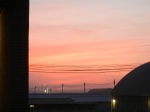
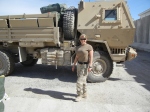
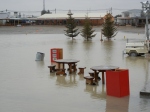 pond instead of the dirt football field that it normally serves as.
pond instead of the dirt football field that it normally serves as.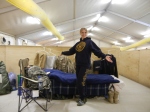 be worse than it turned out to be. We had heat, at least most of the time. The heater was run off of a gas generator and our second night there, the gas ran out and the heater turned off. It was about 40 degrees in our tent when we woke up that morning! And to top it off, there was no more hot water for the showers. After that, I discovered that if I took a shower around 5 pm there was always hot water.
be worse than it turned out to be. We had heat, at least most of the time. The heater was run off of a gas generator and our second night there, the gas ran out and the heater turned off. It was about 40 degrees in our tent when we woke up that morning! And to top it off, there was no more hot water for the showers. After that, I discovered that if I took a shower around 5 pm there was always hot water.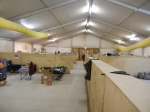 and run out into the dark across an obstacle strewn courtyard, trying to avoid tripping over things like rocks and pieces of rebar. We had to rendezvous in a cement bunker on the other side of the courtyard and stand in the cold for 30-45 minutes before the “All Clear” would sound. I had taken the warmth and safety of my blast-proof dorm room for granted, that’s for sure!
and run out into the dark across an obstacle strewn courtyard, trying to avoid tripping over things like rocks and pieces of rebar. We had to rendezvous in a cement bunker on the other side of the courtyard and stand in the cold for 30-45 minutes before the “All Clear” would sound. I had taken the warmth and safety of my blast-proof dorm room for granted, that’s for sure!
